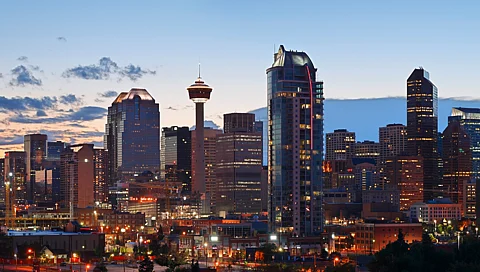

The City of Calgary audit committee was told in its most recent meeting the city posted a $276 million budget surplus in 2024, despite unexpected financial challenges last year, exacerbated by the Bearspaw South feeder main break. The surplus was $40 million higher than 2023.
A report to the committee said the surplus came mostly from "higher franchise fees (also called local access fees) revenue due to higher energy prices, increased investment income and expenditure savings across several tax-supported services."
The local access fee works in lieu of a property tax to run power equipment throughout the city.
However, the report added revenues from local access fees is dropping, with the city getting close to $182 million from the fees last year, compared to $308 million in 2023.
Part of the decline can be attributed to no longer being tied to the province's regulated rate option (the rate of last resort) and moving to a consumption-based model this year, charging customers based on how much power they use.
The report warns a further decrease in revenue from that fee is in the offing this year, after the change in how it is calculated in response to affordability concerns amid rising utility costs.
Audit committee member, Cllr. Andre Chabot, agreed 2024 was likely the last year the city would see as high of a return from the fee.
Chabot told the meeting the city will need to look at how to make up for that loss of revenue, as some of the extra cash goes to the city's reserve for future capital.
"We've changed our formula, and it's going to change again when we get an agreement on how we actually structure that," said Chabot. "We may have to look at the reserve for future capital as well and what could contribute to that on a go-forward basis because there's going to be an increasing need to supplement that."
The increase in revenue will not ease the 8.9% increase in property taxes facing Calgarians this year, with audit committee chair, Cllr. Evan Spencer, saying he doesn't believe Calgarians are overtaxed.
"We are not insulated from things like inflation. We're not insulated from market swings. We've had a whole variety of challenges, as the City of Calgary," said Spencer. "So no, I do not believe the City of Calgary is overtaxing Calgarians in any stretch or form."
Chabot says he’s pitching an alternative, a $60 million investment from the fiscal stability reserve for the Opportunity Calgary Investment Fund (OCIF), which was created in 2017 to support local businesses and attract new businesses to the city.
"I'll be looking at the federal and provincial governments to see if I can get them to match those dollars again to create economic opportunity, economic development and diversification of our economy," said Chabot.
City administration has recommended putting the operating surplus into its rainy-day fund, the fiscal stability reserve.
The surplus would be available to help offset cost escalations for projects and other developments, potentially reducing the possibility of project funding shortfalls. A shortfall of investment income could increase the burden on taxpayers, while a surplus could reduce that burden.
The audit committee’s 2024 annual investment report goes to city council on Tuesday.
